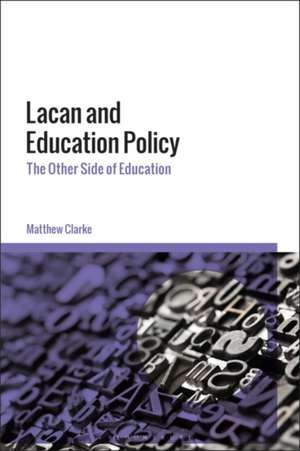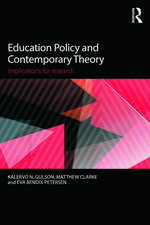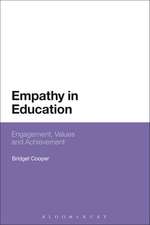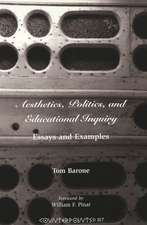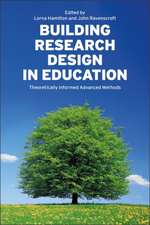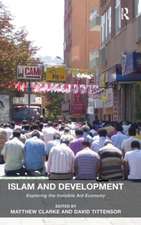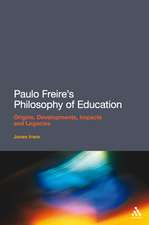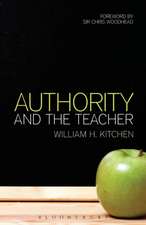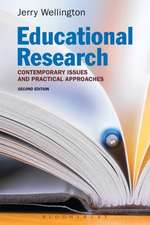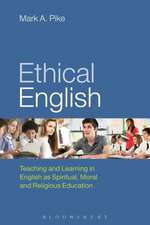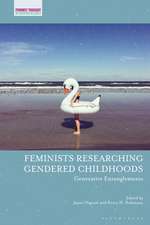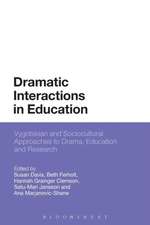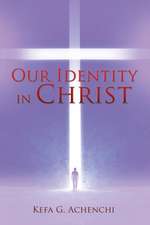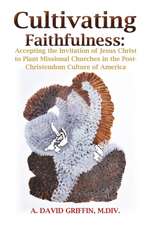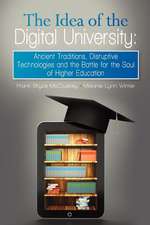Lacan and Education Policy: The Other Side of Education
Autor Matthew Clarkeen Limba Engleză Hardback – 12 iun 2019
| Toate formatele și edițiile | Preț | Express |
|---|---|---|
| Paperback (1) | 216.26 lei 6-8 săpt. | |
| Bloomsbury Publishing – 23 dec 2020 | 216.26 lei 6-8 săpt. | |
| Hardback (1) | 713.72 lei 6-8 săpt. | |
| Bloomsbury Publishing – 12 iun 2019 | 713.72 lei 6-8 săpt. |
Preț: 713.72 lei
Preț vechi: 1027.16 lei
-31% Nou
Puncte Express: 1071
Preț estimativ în valută:
136.58€ • 141.73$ • 114.16£
136.58€ • 141.73$ • 114.16£
Carte tipărită la comandă
Livrare economică 18 martie-01 aprilie
Preluare comenzi: 021 569.72.76
Specificații
ISBN-13: 9781350070554
ISBN-10: 1350070556
Pagini: 192
Dimensiuni: 156 x 234 mm
Greutate: 0.43 kg
Editura: Bloomsbury Publishing
Colecția Bloomsbury Academic
Locul publicării:London, United Kingdom
ISBN-10: 1350070556
Pagini: 192
Dimensiuni: 156 x 234 mm
Greutate: 0.43 kg
Editura: Bloomsbury Publishing
Colecția Bloomsbury Academic
Locul publicării:London, United Kingdom
Caracteristici
Offers a new way of looking at education policy that locates recent developments within the history of political economy during the latter part of the twentieth century
Notă biografică
Matthew Clarke is Professor of Education at York St John University, UK. He is the author of Teacher Education and the Political (2017) and co-editor of Education Policy and Contemporary Theory (2015).
Cuprins
1. Education in the Neoliberal Era: Crisis and Impasse2. Concepts and Contexts: Capitalism and Desire3. The Discourse of the Master and Neoliberal Political Economy: Keep on Working4. The Discourse of the University and Neoliberal Education Policy: The Utopia of Rules5. The Discourse of the Hysteric and Radical Reform: The Return of the Past 6. The Discourse of the Analyst and the Other Side of Education: Subversion and Reinvention7. Looking Awry at Education PolicyReferencesIndex
Recenzii
A superb primer on educational policy, an enlightening discussion of neo-liberalism, and a crystal-clear introduction to Lacanian psychoanalysis.
Matthew Clarke's book brings a new and devastating critical perspective to bear on education policy. His use of Lacan to address fundamental questions about what education has become in the context of neoliberalism enables us to begin to think creatively and with integrity about 'the other side of education'. This is a telling and timely book that skilfully deploys psychoanalytic insights to unpack the fantasies that haunt and inhibit education policy - it is exciting, challenging and important!
It is one of the horrifying ironies of our time that the dominance of university discourse would entail with it the death of education. This is but one of the incredible paradoxes that Matthew Clarke uncovers in his revolutionary Lacan and Education Policy: The Other Side of Education. By bringing psychoanalytic theory to bear on education policy, Clarke reveals that what appears as attention to education is actually nothing but the thorough imposition of the logic of capitalism on all our systems of learning. Calls for more education disguise the desire for more sites of accumulation. Packed with such insights, Lacan and Education Policy completely changes the deal for thinking about how we have been educating.
Matthew Clarke's book provides an insightful and enjoyable foray into an analysis of neoliberal education policies now dominating education systems across the globe. His explication of Lacan's four discourses, Master, University, Hysteric and Analyst, is clear, insightful and accessible. He provides examples not only from schooling, but also public pedagogies to illustrate his argument. The book contributes to the growing interest in affect theory by providing an account of key concepts such as desire, trauma, and fantasy through the lens of Lacanian theory. These are slippery concepts, difficult to grasp, without a strong grounding in psychoanalytic theories. The beauty of Matthew Clarke's book is that he makes these concepts accessible and deploys them to provide insights into the politics of education.
If you want to think critically about education, get a good grasp of Lacan's conceptual language and its uses for social and political critique, as well as understand what all the fuss is about with neoliberalism, then this is the book for you. More than that, Matthew Clarke's book provides a devastating critique of contemporary educational policies that result in disciplinary regimes designed in the interests of the powerful rather than for democratic empowerment through forms of school organisation and practice that put people first.
Matthew Clarke's book brings a new and devastating critical perspective to bear on education policy. His use of Lacan to address fundamental questions about what education has become in the context of neoliberalism enables us to begin to think creatively and with integrity about 'the other side of education'. This is a telling and timely book that skilfully deploys psychoanalytic insights to unpack the fantasies that haunt and inhibit education policy - it is exciting, challenging and important!
It is one of the horrifying ironies of our time that the dominance of university discourse would entail with it the death of education. This is but one of the incredible paradoxes that Matthew Clarke uncovers in his revolutionary Lacan and Education Policy: The Other Side of Education. By bringing psychoanalytic theory to bear on education policy, Clarke reveals that what appears as attention to education is actually nothing but the thorough imposition of the logic of capitalism on all our systems of learning. Calls for more education disguise the desire for more sites of accumulation. Packed with such insights, Lacan and Education Policy completely changes the deal for thinking about how we have been educating.
Matthew Clarke's book provides an insightful and enjoyable foray into an analysis of neoliberal education policies now dominating education systems across the globe. His explication of Lacan's four discourses, Master, University, Hysteric and Analyst, is clear, insightful and accessible. He provides examples not only from schooling, but also public pedagogies to illustrate his argument. The book contributes to the growing interest in affect theory by providing an account of key concepts such as desire, trauma, and fantasy through the lens of Lacanian theory. These are slippery concepts, difficult to grasp, without a strong grounding in psychoanalytic theories. The beauty of Matthew Clarke's book is that he makes these concepts accessible and deploys them to provide insights into the politics of education.
If you want to think critically about education, get a good grasp of Lacan's conceptual language and its uses for social and political critique, as well as understand what all the fuss is about with neoliberalism, then this is the book for you. More than that, Matthew Clarke's book provides a devastating critique of contemporary educational policies that result in disciplinary regimes designed in the interests of the powerful rather than for democratic empowerment through forms of school organisation and practice that put people first.
